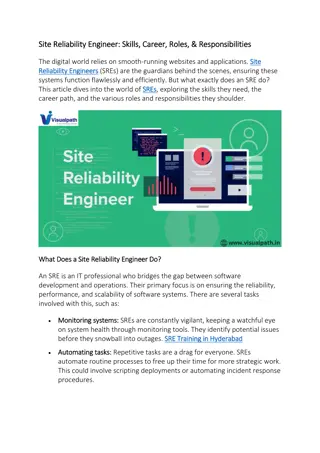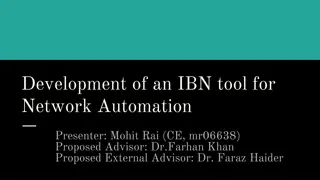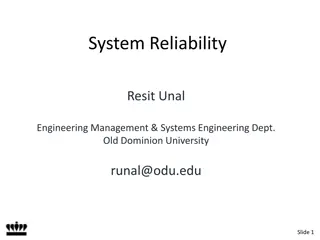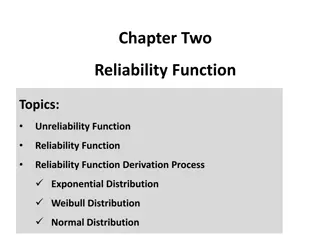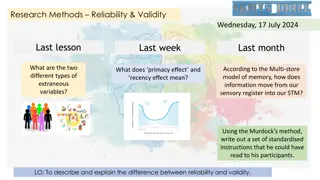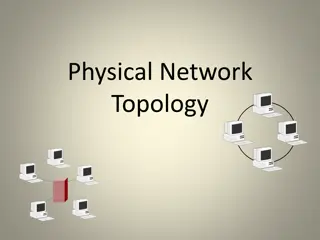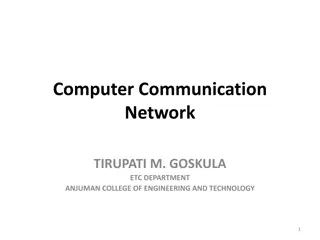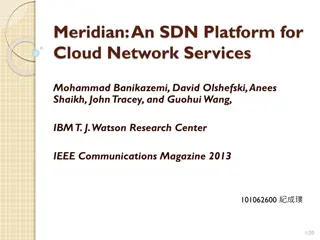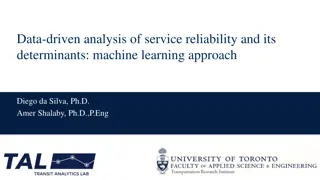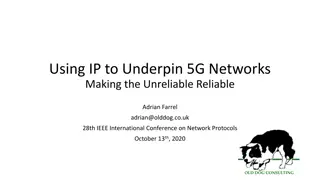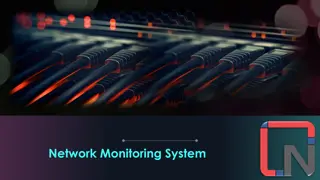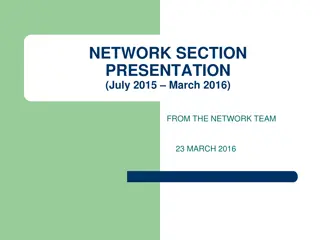Software Engineering and Architecture
Reliability in software systems is crucial, as defects can lead to failures impacting reliability. The number of defects directly affects the system's reliability. Not all defects are equal, so prioritizing defect correction based on return on investment is essential. Testing thoroughly, especially
1 views • 40 slides
Enhancing Wi-Fi Relay Networks for Improved Coverage and Reliability
This document discusses the need to enhance relay frameworks in Wi-Fi networks to improve coverage, reliability, and performance of stations in different ranges. It highlights the challenges of S1G-based relays, proposes enhancements to the relay framework, and introduces new types of relay framewor
1 views • 12 slides
Understanding Software Reliability Metrics
Software reliability is a vital aspect of system quality, ensuring that systems behave as expected and operate without frequent failures. Key concepts include fault, failure, and different time intervals like MTTF, MTTR, and MTBF. By measuring and understanding these metrics, we can assess the relia
1 views • 21 slides
Apache MINA: High-performance Network Applications Framework
Apache MINA is a robust framework for building high-performance network applications. With features like non-blocking I/O, event-driven architecture, and enhanced scalability, MINA provides a reliable platform for developing multipurpose infrastructure and networked applications. Its strengths lie i
3 views • 13 slides
Modeling and Generation of Realistic Network Activity Using Non-Negative Matrix Factorization
The GHOST project focuses on the challenges of modeling, analyzing, and generating patterns of network activity. By utilizing Non-Negative Matrix Factorization (NMF), realistic network activity patterns can be created and injected into live wireless networks. Understanding and predicting user behavi
4 views • 28 slides
DRRS Design to Meet HB1500 Intent
DRRS design aims to meet the requirements of HB1500 in determining the quantity of services needed for reliability standards in ERCOT grid operations. The primary goal is to ensure operational reliability during extreme events with a focus on dispatchable generation facilities. DRRS resources must b
0 views • 6 slides
Ensuring Reliability of Deep Neural Network Architectures
This study focuses on assuring the reliability of deep neural network architectures against numerical defects, highlighting the importance of addressing issues that lead to unreliable outputs such as NaN or inf. The research emphasizes the widespread and disastrous consequences of numerical defects
0 views • 26 slides
Site Reliability Engineering Online Training | Hyderabad
Visualpath offers an effective Site Reliability Engineering Online Training Program. To schedule a free demo, simply reach out to us at 91-9989971070.\nVisit \/\/ \/site-reliability-engineering-sre-online-training-hyderabad.html\nWhatsApp: \/\/ \/catalog\/919989971070\/\n
0 views • 9 slides
Site Reliability Engineering Training Institute in Hyderabad - SRE
Visualpath provides the best SRE Training Course in Hyderabad by real-time experts we are providing a Site Reliability Engineering Course that is available globally in India, the USA, the UK, Canada, Dubai, and Australia To book a demo, please get in touch with us at 91-9989971070.\nVisit \/\/ \/si
2 views • 3 slides
Revolutionizing Network Management with Intent-Based Networking
Explore the concept and benefits of Intent-Based Networking (IBN) in simplifying network configuration and enhancing efficiency. Learn how IBN automates network operations, aligns with business objectives, improves security, and ensures scalability and reliability. Discover the potential of IBN tool
0 views • 14 slides
Understanding System Reliability in Engineering
System Reliability in Science/Engineering involves understanding how products/systems work, as well as the ways they fail and the effects of failures. Reliability is the probability that a system will perform as expected under given conditions and play a crucial role in the design phase to mitigate
0 views • 19 slides
Understanding Reliability Functions in Data Analysis
Reliability functions play a crucial role in data analysis, providing insights into the probability of success or failure over time. This chapter delves into topics like unreliability functions, derivation processes for reliability functions using distributions like exponential, Weibull, and normal.
0 views • 19 slides
Understanding Reliability in Mechanical Engineering
Reliability in mechanical engineering pertains to the ability of a product to perform as expected over a specified period under defined operational conditions. This article delves into the factors influencing reliability, such as numerical value, intended function, product life, and operating condit
0 views • 61 slides
Reliability and Failure Analysis in Engineering Systems
Introduction to failure data analysis, goodness of fit testing, stress-strength modeling, and reliability evaluation in engineering systems. Learn about failure rate estimation, MTBF/MTTF calculations, and practical examples illustrating reliability metrics in industrial applications.
0 views • 27 slides
Understanding Research Methods: Reliability and Validity in Psychological Studies
In psychological research, understanding reliability and validity is crucial. Reliability refers to consistency in measurements, while validity focuses on whether the results accurately represent the phenomenon being studied. Ensuring both reliability and validity enhances the credibility of researc
0 views • 13 slides
Network Compression Techniques: Overview and Practical Issues
Various network compression techniques such as network pruning, knowledge distillation, and parameter quantization are discussed in this content. The importance of pruning redundant weights and neurons in over-parameterized networks is highlighted. Practical issues like weight pruning and neuron pru
0 views • 37 slides
Network Slicing with OAI 5G CN Workshop Overview
Overview of Network Slicing with OAI 5G CN workshop focusing on the crucial role of network slicing in realizing the service-oriented 5G vision. This workshop covers topics like multiple logical networks creation on shared infrastructure, different types of network slices, preparation and instantiat
1 views • 6 slides
Understanding Physical Network Topologies
Physical network topology refers to the layout of cables, computers, and peripherals in a network, distinct from logical topology. Common physical topologies include Star, Ring, Linear Bus, Tree, and Mesh. Each topology has its advantages and disadvantages, impacting network performance and reliabil
0 views • 16 slides
Distributed DBMS Reliability Overview
This chapter delves into the critical aspect of reliability in distributed database management systems (DBMS). It explores the concepts, measures, types of faults, and the significance of maintaining atomicity and durability properties of transactions in ensuring system reliability. The narrative hi
0 views • 51 slides
Understanding Snort: An Open-Source Network Intrusion Detection System
Snort is an open-source Network Intrusion Detection System (NIDS) developed by Cisco, capable of analyzing network packets to identify suspicious activities. It can function as a packet sniffer, packet logger, or a full-fledged intrusion prevention system. By monitoring and matching network activity
0 views • 23 slides
Understanding Computer Communication Networks at Anjuman College
This course focuses on computer communication networks at Anjuman College of Engineering and Technology in Tirupati, covering topics such as basic concepts, network layers, IP addressing, hardware aspects, LAN standards, security, and administration. Students will learn about theoretical and practic
0 views • 72 slides
Transportation Network Modeling and Analysis with C.Coupled SE Platform
This content outlines the features and functionalities of the C.Coupled SE Platform (CSET Platform) developed by the Connetics Transportation Group. It covers aspects such as interface design, inputs merging, purposes, platform development using Cube, TAZs merging, and network attributes. The platfo
0 views • 11 slides
Enhancing Internet Telephony Quality Through Predictive Relay Selection
Examining the quality of Internet telephony in relation to network performance, this research explores the use of Managed Overlay to improve call quality for services like Skype. Analysis of 430 million Skype calls reveals that a significant portion experience poor network performance, emphasizing t
1 views • 26 slides
Meridian: An SDN Platform for Cloud Network Services
Meridian is an SDN platform developed by Mohammad Banikazemi, David Olshefski, Anees Shaikh, John Tracey, and GuohuiWang at IBM T. J. Watson Research Center. The platform focuses on providing cloud network services efficiently. It encompasses an architecture that enables faster and more convenient n
0 views • 21 slides
NERC Operating Committee Update & Strategic Plan Overview
The NERC Operating Committee (OC) oversees critical operational reliability matters within the electricity sector, aligning with the organization's strategic plan for the next five years. Led by Chair Jim Case and Vice-chair Lloyd Linke, the OC collaborates with various stakeholders, focusing on eme
0 views • 15 slides
Lessons in Network Reliability and Systems Design
Exploring the importance of end-to-end reliability in network communication, the examples highlight the pitfalls of assuming network perfection. From checksum failures in file copying to voting system flaws, the need for robust systems and user verification becomes evident. Emphasizing the challenge
0 views • 21 slides
Understanding Network Analysis: Whole Networks vs. Ego Networks
Explore the differences between Whole Networks and Ego Networks in social network analysis. Whole Networks provide comprehensive information about all nodes and links, enabling the computation of network-level statistics. On the other hand, Ego Networks focus on a sample of nodes, limiting the abili
0 views • 31 slides
IEEE 2018 Emerging Technologies Reliability Roundtable Summary
The IEEE 2018 Emerging Technologies Reliability Roundtable took place in Austin, Texas, featuring speakers from various technology companies discussing topics such as software reliability, 5G network challenges, and ultra-reliability in wireless communication. The agenda included insightful talks, Q
0 views • 11 slides
ACE RAM Workshop - Barcelona 2019: Reliability and Maintenance Concepts
The ACE RAM Workshop conducted by George Pruteanu in Barcelona focused on topics such as RAM prediction, FMEA, maintenance concepts, preventive and predictive maintenance, condition monitoring systems, corrective maintenance, and design for maintenance. The workshop delved into reliability predictio
0 views • 16 slides
Machine Learning Approach for Analyzing Service Reliability Factors in São Paulo Transit Data
Explore how machine learning methods are applied to analyze São Paulo transit data, focusing on factors affecting bus service reliability measures. The study delves into quantifying and identifying relevant factors impacting service reliability across different levels such as stops, routes, and the
0 views • 10 slides
Understanding Reliability Theory in Engineering and Mathematics
Reliability theory, presented by S. Ithaya Ezhil Manna, explains the concept of reliability as the probability of a component functioning properly over time. The theory defines reliability in terms of the random variable X representing component life or time to failure. Key points include the defini
0 views • 22 slides
Exploring Network Slicing in Future 5G Networks
The research delves into the design of a 5G-ready architecture known as NFV-based Network Store, aiming to serve as a digital distribution platform for 5G applications. By focusing on network slicing and programmability, the architecture enhances resource efficiency and agility in deploying software
0 views • 17 slides
Enhancing 5G Networks with Reliable IP Underlay
Addressing the need for reliability in 5G networks, this article explores using IP as an underlay network to support new services and applications demanding improved networking behaviors. It discusses the connectivity provided by the underlay network, the evolution of IP, and the challenges in build
0 views • 14 slides
Network Function Virtualization (NFV) Overview
Network Function Virtualization (NFV) focuses on virtualizing network functions to improve efficiency and reduce costs in network infrastructure. The lecture discusses key readings, devices that compose a network, specialization of devices, benefits of one-device-does-anything approach, and the goal
0 views • 21 slides
Enhancing Network Stability with Network Monitoring Systems
Network monitoring is crucial for efficient management and proactive issue detection in a network environment. Factors influencing an effective network system include choosing the best OEM, SLA agreements, and selecting a reliable System Integrator. Reactive monitoring can lead to financial losses a
0 views • 12 slides
Understanding Network Testing in Modern Computing Environments
Today, network connections are essential for various computing tasks, from accessing the internet to setting up local area networks. This article delves into the importance of evaluating existing networks, testing network performance, and ensuring stable connections for optimal user experience. It d
0 views • 46 slides
Integration of Light Communications for Enhanced Reliability in Multilink Operations
The presentation discusses the integration of Light Communications (LC) into the Multilink Operation (MLO) framework to enhance reliability and reduce latency in wireless communications. By proposing the incorporation of LC as a new offloading opportunity within the MLO framework, the potential for
0 views • 15 slides
Understanding Reliability Measures in Research Supervised by Dr. Mohammed Mahdi Sharifi
Reliability is crucial for assessing the consistency of metrics in research. Various methods such as inter-rater reliability, test-retest reliability, parallel forms reliability, and internal consistency reliability help ensure the dependability of research findings. By examining factors like judgme
0 views • 9 slides
Accelerating Systemic Change Network Inaugural Workshop Summary
The Accelerating Systemic Change Network held its inaugural workshop at Howard Hughes Medical Institute in July 2016 to address the lack of coordination in improving higher education. With a vision to become a professional hub for change researchers in STEM education, the network aims to enhance ind
0 views • 5 slides
University Network Section Overview July 2015 - March 2016
The presentation covers the network team structure, team members, objectives, goals, report outline, network statistics, accomplishments, and future plans of the university network section from July 2015 to March 2016. It highlights efforts to provide stable internet and intranet services, restructu
0 views • 16 slides








